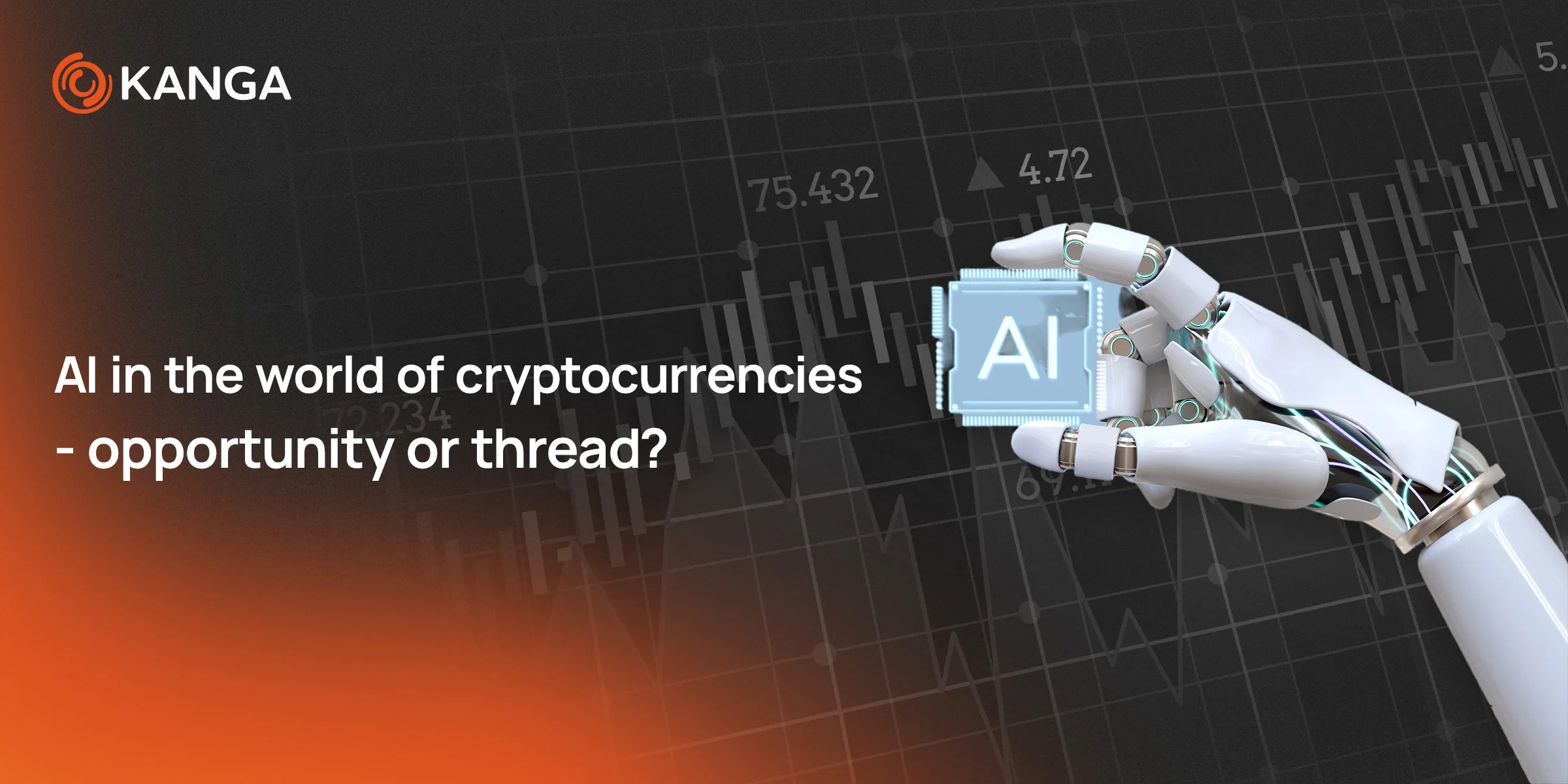The impact of AI on cryptocurrency analysis and investments

Written by
Zuzanna Krychowiak
Published on
In the world of cryptocurrencies, the future of finance is constantly intersecting with the latest technologies. Almost everyone is familiar with the concept of artificial intelligence (AI), which is revolutionizing the way we make various decisions, including investment decisions. Taking a closer look at its influence on the cryptocurrency market, we discover more advanced methods of analysis and ways to mitigate risk and enhance investment efficiency.
Market trend identification
AI algorithms are capable of processing and analyzing vast amounts of data that are inaccessible to humans. They have the ability to identify hidden patterns in market data that may indicate upcoming price changes. Innovative predictive models that utilize machine learning can effectively analyze both structural and irregular data, such as tweets, forum posts, or news headlines, which often influence market fluctuations. For example, tools like Google’s BERT or OpenAI’s GPT-4 utilize sentiment analysis based on social media data to predict market reactions to new information or global events.
With AI’s natural language processing (NLP) capabilities, algorithms can “understand” and interpret the meaning of messages, allowing them to predict the impact of these messages on cryptocurrency markets. For instance, research published in the “Journal of Financial Data Science” in 2020 demonstrated that NLP algorithms can effectively analyze the sentiment tone of press releases and Twitter posts, enabling the forecasting of short-term price movements, such as those of Bitcoin.
Furthermore, analyzing large datasets from financial markets enables investors to identify current trends and detect anomalies that may suggest market manipulations or unusual behaviors of other market players. This kind of advanced analysis, supported by AI, significantly accelerates investors’ reactions to market changes, giving them an advantage over those who rely solely on traditional methods of analysis.
Portfolio management with AI assistance
Another application of AI in the world of cryptocurrencies can be found in investment portfolio management. This introduces a high level of automation and asset allocation optimization. Modern algorithms can not only pinpoint optimal times to buy or sell cryptocurrencies but also effectively diversify investments. This, in turn, increases the chances of maximizing profits while minimizing risks. For example, algorithms based on methods such as natural language processing and deep learning analyze quantitative market data, qualitative sentiment indicators, which can influence investment decisions.
Using advanced AI technologies, these systems can automatically adjust portfolio allocation in response to changing market conditions, based on continuously updated predictive models. Many investment platforms already utilize AI to optimize investment strategies for their users, providing asset management personalization previously available only to very wealthy clients.
Ethical and social implications
With the growing dependence on AI in cryptocurrency investments, significant questions arise regarding ethics and social equality. There is a risk that algorithms, though designed to objectively analyze data, may unintentionally favor certain groups of investors due to biases inherent in the training data. This, in turn, can potentially lead to market inequalities.
Numerous studies have also been conducted on algorithms that can reproduce or even exacerbate existing biases. If the input data used for training AI models is not sufficiently diverse, algorithms may perpetuate existing biases and even amplify them.
Why is so much attention devoted to this issue? Despite its advanced nature, AI technology still depends on the quality and diversity of the data provided to it. Therefore, regular updates and audits of AI models, especially those used in critical applications such as finance, are essential to ensure their fairness and effectiveness.
Additionally, errors in algorithm design or deliberate manipulation can lead to market instability. As indicated in analyses, such manipulations can introduce artificial price fluctuations and influence investment decisions of other market participants, questioning overall financial stability.
Dependency on algorithms – risks and solutions
AI algorithms shape many aspects of our lives, and in the context of cryptocurrency investments, another challenge arises – the growing dependence on algorithms. This dependence carries the risk of eroding traditional market analysis skills among professionals. In the future, as machines increasingly predict and react to market changes effectively, human intuition and experience may become less valued, or even unnecessary. This raises the question of whether, with the increase in technological efficiency, we are simultaneously losing critical market insights necessary for predicting unforeseen events.
Changing market conditions and constant innovations require investors to adapt and critically evaluate situations. Without these competencies, entire financial sectors may become overly susceptible to external shocks and instabilities.
Strengthening trust and stability in AI
In response to these challenges, many experts suggest implementing regulatory standards and increasing transparency in algorithm operations. These actions aim to enhance trust in AI technology in investments and ensure that the cryptocurrency market remains stable and accessible to a wide range of investors. By implementing clear legal and ethical frameworks, it will be possible to maintain a healthy balance between technological innovation and investment safety.
Transparency in AI algorithm operations may include regular audits, open access to model creation methodologies, and educational initiatives aimed at investors, which will help understand how exactly this technology influences the market. Therefore, as important as developing new technologies is ensuring that we do not lose the human dimension of investing – critical thinking, intuition, and risk assessment.
Conclusion
Introducing AI into cryptocurrency analysis and investments opens up new possibilities but also requires responsibility and thoughtful regulation. While the potential of these technologies is immense, the risks and ethical challenges they bring should not be underestimated. This is especially important in the digital age, where the boundaries between technology and humans are increasingly blurred.